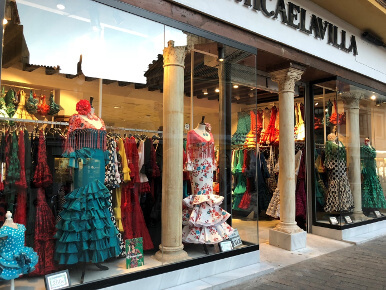In my last blog you learned all about the history of the flamenco dress and what it is/looks like. If you didn’t read that blog yet, be sure to check it out here. I also told you that I bought my very first flamenco dress. It was quite a process, it was almost like buying a wedding dress (even though I have no idea what that would be like because I have never bought a wedding dress in my life, but I imagine the process is more or less like that).
I had been looking at dresses on the internet and shops I passed by on my way home from work, but I never really dared to enter a store because this ‘guiri’ (foreigner in Spanish) had no idea how you’re supposed to behave in a dress store. I realised I needed reinforcements. So I asked one of my sevillana friends to go with me. She has 4 dresses of her own, thus she is an expert in this field. Together we went on the hunt. First we went to a few stores that she knew already and had good experiences with.
The first store had a book with all the available models for that year. We were going through the pictures and I saw some that I really liked, because they had a special type of skirt. My friend advised against buying a dress like this, because next year, that dress will not be in fashion anymore. Like I said in my other blog, these dresses are fashion sensitive, and different styles are in fashion every year. If you don’t want to spend much on a dress and want a dress that will last you a few years, it’s best to buy a dress with a ‘timeless’ skirt.
After looking around in that first store, we found out that it was a bit too expensive. I had a pretty low budget of € 300,- (Yes, I know, € 300,- is a lot of money, but for a flamenco dress that’s really really low budget) and most dresses there were over € 500,-. So we decided to go to another shop. The dresses there were the dresses from the past years and they were a lot cheaper. The prices there started at around € 200,-, but the dresses were not that great and I didn’t find anything I like. That was the first day of shopping.
A week later, we went to another shop. Micaela Villa is a shop that I passed by a lot on my way home from work, and I had seen some dresses that I really liked there. There were two dresses I tried on there that I completely fell in love with. A dark red one and a dark blue one. The red dress had a ‘fashionable’ skirt, and looked really beautiful. But because it had this type of skirt and it wasn’t too comfortable, I decided to go with the blue dress. A dress with a ‘timeless’ skirt, in a beautiful dark blue colour that went really well with my blue eyes and
blonde hair (or so all the women in the shop at that moment told me), and I am absolutely in love with it. It fit right in my budget, so it was the perfect choice for me.
So I found my dress! But the dress is only the base of the complete flamenco outfit. I still need to get my ‘complementos’. These are the matching accessories you put on with your dress. The wildest colour schemes are possible and actually fashionable as well. Mantoncillos are scarves that flamencas wear over their shoulders and they tie them together with a broche. They wear a big flower in their hair and big colourful earrings. I didn’t shop for those yet, that will require a in-depth study of colours and good combinations.
I can’t wait until the 15th of April arrives, so I can finally wear my dress and show it off to the world. Are you in Sevilla during the feria week? Check out our Feria Tour and make reservations ahead of time so you’ll be sure of a place! I hope to see you then!
Robin